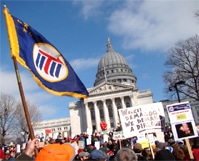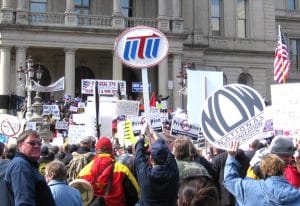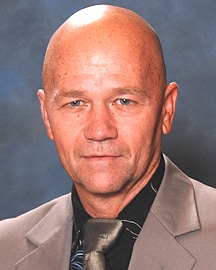05/02/13 UPDATE: Ohio right-to-work bills were considered “dead-on-arrival” as Senate Republic President Keith Faber rejected the bills last night in an after-hours press conference.
“We have an ambitious agenda focused on job creation and economic recovery, and Right to Work legislation is not on that list. After discussions with other leaders and my caucus, I don’t believe there is current support for this issue in the General Assembly,” Faber said. “The only purpose this discussion serves right now is to generate a bunch of breathless fundraising appeals from the Ohio Democratic Party.”
Original Story:
Ohio has joined Pa. and Mo. in the fight against right-to-work bills. Today, two Republican Ohio Representatives Kristina Roegner and Ron Maag submitted bills seeking to take away rights from unions and their members in Ohio.
Roegner’s bill goes after private-sector unions such as UTU-SMART while Maag’s bill focuses on unions of the public sector.
Ohioans are clearly against this type of legislation with 60 percent of Ohio voters having voted down similar legislation in Senate Bill 5 (SB 5) that was introduced in 2011. SB 5 almost cost Ohio Republican Governor John Kasich his job when he sought to make SB 5 law without allowing Ohioans to vote on it. Petitions and outcries were heard loud and clear in Ohio’s government and SB 5 went to the people to be voted on in November 2011 and was voted down.
Ohioans are still working on getting an amendment passed that would allow the people of Ohio to vote to remove a governor from office as a result of the SB 5 fiasco.
Kasich has refused to support any right-to-work bill since SB 5 failed and has instead remained focused on other legislation. Kasich has yet to weigh in on the new legislation that was introduced today.
Pennsylvania and Missouri are also facing similar bills in their respective Houses. Recently, the state of Maine rejected right-to-work bills in both the state House and Senate, effectively killing those bills.
Tag: anti-union

Ten different unions marched in downtown Chambersburg, Pa., in protest of the bill over the weekend. If passed, the bills would allow non-union members the same benefits that dues-paying members receive, such as higher wages and benefits and union representation.
House Bill 50, sponsored by Rep. Daryl Metcalfe, seeks to end union membership or dues payment by non-members as a condition of employment.
House Bill 51, sponsored by Rep. Kathy Rapp, seeks to prohibit unions from collecting dues from non-union public school employees.
House Bill 52, sponsored by Rep. Fred Keller, would prohibit unions from collecting dues from non-union state employees.
House Bill 53, sponsored by Rep. Jim Cox, seeks to prohibit unions from collecting dues from non-union local government employees. Rep. Stephen Bloom is also proposing House Bill 250, that would repeal a state law known as “maintenance of membership.” The bill would essentially allow dissatisfied union members to quit their union at any time, as opposed to a current 15-day window toward the end of contracts. Rep. Jerry Knowles also seeks to pass an umbrella bill that would prevent union membership from being a condition of employment in the private sector.
Metcalfe has introduced this union-busting legislation in every session over the past 14 years. This year is viewed as different, because Republicans control both the House and Senate of the Pennsylvania Legislature, as well as the governor’s seat.
Legislators in favor of the bill hope to introduce it to the House speaker soon.

The union busting that occurred last year in Wisconsin, Ohio, Arizona and other states continues today, with local and state governments trying to push through right-to-work (for less) legislation.
The death of the “Iron Lady” Margaret Thatcher makes us remember that union-busting is not just here in the United States, but is a world-wide issue. During her time in office from May 1979 to November 1990, Thatcher’s legacy of union busting was world renown. She was able to pass legislation to take away the rights of the union worker like none other was able to do before her.
Last year, Gov. Scott Walker tried to take a page out of Thatcher’s notebook when he tried to put through union-busting legislation in Wisconsin. Many were shocked when they heard about the legislation that Walker was trying to pass. Other states were quick to follow Walker’s example and tried to push through their own right-to-work and union-busting laws. This was our wake up call to come together in solidarity and fight like the unions fought in the days of Thatcher’s reign.
We must not allow ourselves to become complacent. For it is when we become complacent and stop keeping watch over our rights that we open ourselves up to our enemies’ strikes against us.
We must be diligent in our watch and stay informed about those who want to take away our rights as workers. One way to do this is to contribute to the UTU’s PAC fund. This fund enables us to stay alert and fight the legislation that would harm the middle-class worker and take away our hard-won rights.
Let Thatcher and Walker be reminders to us that we need to band together as unions in solidarity and continue to stay alert to fight against union-busting legislation.
UTU members are stepping up to the plate in the fight to preserve collective bargaining rights, Amtrak, workplace safety, Railroad Retire
Hundreds of active and retired members — individually and through their locals, general committees and state legislative boards — have contributed to the UTU Collective Bargaining Defense Fund and the UTU PAC.
A $10,000 contribution to the Collective Bargaining Defense Fund was made by Amtrak General Committee of Adjustment 769 and delivered by General Chairperson Roger Lenfest.
In Arizona, , the 292 members of UTU Local 113 in Winslow recently almost doubled their monthly PAC contributions. “They have a lot of pride and they talk about the UTU PAC at every meeting,” said State Legislative Director Greg Hynes. “All the officers of this local are dollar-a-day PAC members or more — and some contribute $50 monthly.”
Three of Local 113’s officers made clear why they are active in the UTU PAC:
Alternate Delegate Chris Todd: “PAC is our political voice. Without it we’re just rolling the dice on our future.”
Local Chairperson Jim Polston: “I was able to convey to our membership the importance of PAC. Once you do that our members are proud to help out.”
Treasurer Mike Branson: “I contribute to our UTU PAC because without action there would be no union.”
In the wake of UTU members — in solidarity with brothers and sisters from other labor organizations — demonstrating against state legislative action to destroy organized labor, anti-labor bills have been slowed and education of the electorate and the media has generated public outrage.
In Wisconsin, six state lawmakers who led the fight to strip public employees of their collective bargaining rights now face a recall election; and an injunction against implementation of the legislation was ordered by a state court, with the law now facing state supreme court review.
In Ohio, a petition drive led by union members placed a similar law as Wisconsin’s on hold pending a voter referendum this fall.
The UTU Collective Bargaining Fund is providing assistance to UTU members who are engaging in demonstrations and other voter outreach activities nationwide.
The UTU PAC, meanwhile, is helping labor-friendly state legislative and congressional candidates prepare to mount challenges against political extremists who have declared war on working families and organized labor.
The National Conference of State Legislatures reports that since 2009, 729 anti-labor bills have been introduced in 48 separate states. In Congress, a bill is pending to invalidate a National Mediation Board ruling that representation elections be decided on the number of votes cast, without counting those not voting as having voted against union membership.
A U.S. Supreme Court decision known as “Citizens United” opened the door to unlimited political donations by corporations for political advertising that will accelerate attacks on organized labor. While labor unions cannot match such donations, labor-union PACs can make a difference on behalf of labor friendly candidates; and our primary strength is in getting out the vote — and then casting ballots — on behalf of labor-friendly candidates.
It is well established that union families are more likely to vote in elections, and the combination of PAC contributions to labor friendly candidates, voter outreach by union members and union families casting votes for union-endorsed candidates is a powerful response to corporate interests and their candidates whose intent is to destroy organized labor.
For more information on the UTU Collective Bargaining Defense Fund, click on the link at the end of this article, and please consider increasing your UTU PAC contributions. If you are not yet a UTU PAC member, please consider joining.
As President Mike Futhey has said, “If you believe in something strong enough, you fight for it. Together, in solidarity, we can and will win this fight and emerge stronger than ever.”
https://www.smart-union.org/collective-bargaining-defense-fund/
Former Supreme Court Justice Louis Brandeis coined the term, “Sunlight is the best disinfectant.”
Indeed, sunlight cast by labor-union members on the dark-of-night action by political extremists in the Wisconsin legislature is having a meaningful impact in Wisconsin and beyond.
Recall that the Wisconsin legislature’s Republican majority voted in March — in violation of the state’s open meetings law — to eliminate collective bargaining rights for public employees. They gathered on less than two hours’ notice in the dark of night to vote without a single Democrat in the chamber.
State Judge Maryann Sumi last week granted a permanent injunction against the law’s implementation, and chastised those Republican lawmakers for the method in which they conducted the vote.
Judge Sumi called the action a trashing of “transparency of government,” adding that “one of the core principles of democracy [is] the right of the people to monitor the people’s business.” In the wake of the injunction, the Wisconsin Supreme Court will hear arguments on the bill in June.
Some of the credit for Judge Sumi’s ruling belongs to the UTU’s Collective Bargaining Defense Fund and similar efforts by other labor organizations.
Almost immediately after that now infamous in-the-dark-of-night Wisconsin senate vote, union members began demonstrating against union-busting by political extremists — demonstrations joined by tens of thousands of citizens that led to extensive media coverage and editorials criticizing the political extremists.
Public sentiment quickly turned against the political extremists in Wisconsin and in other states. A lawsuit followed, seeking the injunction issued by Judge Sumi; and public outrage resulted in petitions for a recall of the extremists, who now must face Wisconsin voters in a special election in July. Hundreds of UTU and other union members fanned out across the state seeking signatures for the recall petitions.
Also significant following the union demonstrations against union-busting was a surprise result in a race for a seat on the Wisconsin Supreme Court.
The conservative incumbent, seen as a shoo-in, barely squeaked by as Wisconsin voters flocked to the polls in record numbers to support a moderate challenger. The Madison, Wis., Capital-Times newspaper said the close vote “would almost certainly never have happened had Democrats, unions and other liberal groups not channeled anger against Gov. Scott Walker and the Republican-controlled legislature into support” for the moderate challenger.
In Ohio, where extremists passed a similar union-busting law, union demonstrations also induced public outrage, and petition signings that have put the Ohio union-busting measure on hold pending a voter referendum on the law in November.
The UTU’s Collective Bargaining Defense Fund has one objective: Reminding elected officials that organized labor is a potent political force able to mobilize millions of voters, and to set the stage for recall elections of anti-union lawmakers.
To learn more about the UTU Collective Bargaining Defense Fund, click on the following link:
https://www.smart-union.org/collective-bargaining-defense-fund/
Former UTU International President Al Chesser (1972-1979) is now 97 years old, and the fire in his belly in support of organized labor has never dimmed.
The following was written by Chesser in response to creation by President Mike Futhey of the Collective Bargaining Defense Fund, intended to create public awareness of — and opposition to — the attack on collective bargaining rights by political extremists in scores of states and in Congress. Before his election as UTU International president, Chesser was the UTU’s national legislative director.
By Al Chesser
The objective of political extremists — those holding elective office and those seeking elective office — is to destroy labor unions, which are among the most patriotic and democracy-loving organizations in our nation.
When dictators take over a country, one of their first objectives is to destroy labor unions. If this no-compromise, labor-union hating group takes control of the U.S. House of Representatives and U.S. Senate — as they have done in a number of state legislatures — America could cease to be a democracy.
This group of extremists not only is targeting collective bargaining rights; it is intent upon destroying Railroad Retirement, Social Security and Medicare, threatening the financial security of current and future retirees.
If these political extremists are able to destroy organized labor, they will destroy the many achievements of the labor movement, and the principles we have worked and sacrificed so hard for on behalf of working families.
Overtime pay, paid vacations, employer-provided health care, retirement benefits and workplace safety laws and regulations all exist because of labor unions — and all are coming under attack by political extremists.
I am grateful for this opportunity to contribute $500 to the UTU’s Collective Bargaining Defense Fund to help fight this war against organized labor and working families.
I say to every labor union officer and union member: Don’t get caught asleep at the switch. Don’t let these political extremists fast talk you. If they destroy organized labor, our financial security will be a shambles. Our earnings, benefits and workplace safety will no longer be collectively bargained. We will be at the mercy of employers.
To my railroad brothers and sisters, I tell you that this would set us back to the 1800s, when the lives of working men and women were nearly the equivalent of slave labor.
The threat from today’s political extremists is the most dangerous we have faced since before enactment of the Railway Labor Act and the National Labor Relations Act.
Light the fire in your belly and join our fight. We can, will and must beat back this attack from those who want to destroy the union movement in America.
Please contribute to the UTU Collective Bargaining Defense Fund, and participate in the UTU Political Action Committee.
MADISON, Wisc. — Are labor rallies in support of collective bargaining rights effective? Can the UTU Collective Bargaining Defense Fund make a difference?
Do trains run on tracks? Do buses operate on highways?
As for Wisconsin, the proof of the value of labor rallies was reflected in balloting for state supreme court justice, as a previously almost unknown state Democrat, JoAnne Kloppenburg, almost upset a presumed shoo-in April 5 — incumbent conservative Republican David Prosser, who had been “expected to coast to a victory for a second 10-year term,” according to the Madison Capital Times newspaper.
Hundreds of thousands of Wisconsin voters, vocally outraged at the state’s Republican governor and Republican-controlled legislature for their vicious attacks on public-employee collective bargaining, flocked to the polls in record numbers in support of the underdog Kloppenburg.
The balloting was widely viewed as more of a referendum on the anti-union attacks of the state’s Republican governor and Republican-controlled legislature than a vote for supreme court justice.
Said the Capital Times: “It is rare to unseat a sitting supreme court justice [and the close vote that followed] would almost certainly never have happened had Democrats, unions and other liberal groups not channeled anger against Gov. Walker and the Republican-controlled legislature into support for Kloppenburg.”
Prosser was viewed as a supporter of Walker and his anti-union agenda. The New York Times quoted Prosser as having said he was proud of his membership among the state supreme court’s “common sense 4-3 conservative majority.”
The Wisconsin law revoking public-employee collective bargaining rights is on hold pending a judicial challenge that is expected to reach the state supreme court. Had Kloppenburg prevailed, the state supreme-court’s seven-member majority will shift from conservatives to liberals.
Although neither candidate has expressed an opinion on the controversial collective bargaining law and how it was enacted — by the Republican majority after Democrats boycotted the legislature — it is widely recognized that the vote was, in large part, a referendum on the anti-union politics of Republican Gov. Scott Walker and the right-wing led extremist legislature.
Labor union members from across Wisconsin have rallied in opposition to Gov. Walker’s and the legislature’s anti-union attacks. The UTU Collective Bargaining Defense Fund is helping to supply UTU rally participants with signs and T-shirts with slogans — and other materials are on order for continued rallies nationwide that help to attract and focus public opposition to attacks on collective bargaining rights and labor unions.
Hundreds of labor-union members — including dozens of UTU members — were on hand at polling places in Wisconsin to collect thousands of signatures from voters on petitions to recall eight Republican lawmakers who voted to revoke public-employee collective bargaining rights.
Many of the lines to sign the petitions were said to have been as long as the lines to vote, in what was described by the media as an unusually large voter turnout.
UTU members interested in joining a rally in support of collective-bargaining rights should contact their state legislative director.
An opinion article recently published by the Financial Times and Fox News, written by conservative financial columnist Liz Peek, takes a nasty and incorrect swipe at Railroad Retirement, saying Railroad Retirement should be eliminated and folded into Social Security.
The argument begins with a major falsehood — that Railroad Retirement is costing the American taxpayer.
In fact, Railroad Retirement costs the American taxpayer not a single penny.
Not only are all Railroad Retirement benefits paid from payroll taxes of railroads and their workers, but so is the overhead operation of the Railroad Retirement Board.
Scrapping Railroad Retirement and folding it into Social Security wouldn’t save the federal government or the American taxpayer a single penny. But shutting it down would ravage the retirement security of some 600,000 current railroad retirees and their families, as well as future railroad retirees and their families.
The truth is:
- The Railroad Retirement Tier I benefit is roughly equivalent to Social Security benefits.
Railroads and their employees each pay the same 6.2 percent payroll tax as employers and employees covered by Social Security. In what is strictly an accounting transfer, Railroad Retirement payroll taxes are transferred by the Railroad Retirement Board to the Social Security Administration, and then Social Security returns the equivalent Social Security benefits due railroad retirees to the Railroad Retirement Board. It is strictly an accounting transfer.
Although Tier I does provide benefits beyond what is paid by Social Security — such as early retirement and occupational disability — those additional Tier I benefits are paid entirely out of the Railroad Retirement Trust Fund — maintained entirely by railroads and their employees through payroll taxes.
- The Railroad Retirement Tier II benefit, which is equivalent to a defined benefit private pension, is fully funded by additional payroll taxes paid solely by railroads and their employees — 3.9 percent by employees and 12.1 percent by railroads.
- If the Railroad Retirement Trust Fund faces a shortfall, railroads are on the hook for higher payroll taxes — not the American taxpayer. That’s the law.
Railroad Retirement was created before there was Social Security, and has remained separate from Social Security, but is funded fully by railroads and their employees.
Although Congress sets the payroll tax rates and benefit levels, it does so in collaboration with railroads and rail labor — and not a penny of general tax revenue has been or is used for Railroad Retirement.
The unwarranted, unsubstantiated and unjust attack on Railroad Retirement by right-wing extremists is as phony as claiming that elimination of public-employee collective bargaining rights will solve state financial problems.
The mean-spirited attack on Railroad Retirement is part of a more broad effort to weaken and destroy organized labor.
 By Assistant President Arty Martin
By Assistant President Arty Martin